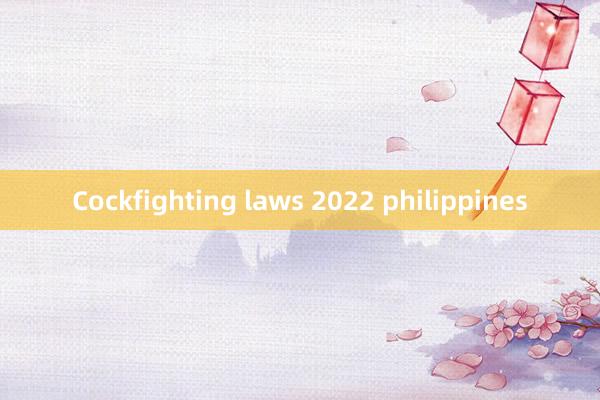
Cockfighting, known locally as "sabong," has been an integral part of Philippine culture for centuries. This traditional blood sport involves two roosters, bred for strength and aggression, fighting to the death in an arena while spectators place bets. While sabong has long been accepted and even celebrated in many parts of the country, its legal status has been shaped by both regulation and controversy. In 2022, the laws governing cockfighting in the Philippines remained complex, reflecting the tension between preserving cultural practices and ensuring ethical standards.
Cockfighting in the Philippines is as old as its recorded history, with accounts of the practice dating back to pre-colonial times. However, legal regulation of the sport began in the 1970s with the enactment of Presidential Decree No. 449, also known as the Cockfighting Law of 1974. This law established specific guidelines for the conduct of cockfighting in the country, including the licensing of cockpits, the regulation of betting practices, and the designation of special cockfighting days, known as "sabong days."
The law sought to bring order to a practice that was often chaotic and unregulated. It restricted cockfighting to Sundays and legal holidays, ensuring that the sport did not interfere with the workweek. Additionally, cockfighting could only be conducted in licensed arenas, known as cockpits, Tìm Hiểu Về Link Vào Nhà Cái W88_ Những Điều Cần Biết and the events had to be officiated by a licensed gamefowl handler.
Despite these regulations, Bộ phần mềm học tiếng Việt BC Nhớ Lần Mới BC - Học Tiếng Việt một cách thú vị và hiệu quả sabong has often operated in a legal gray area, Cách Ly Trang Bóng Trên Mạng_ Thách Thức và Giải Pháp Hiện Đại with many unlicensed cockfighting events, commonly referred to as "tupadas," occurring in remote areas. These underground events bypass legal regulations, making them difficult for authorities to control.
In 2022, the laws around cockfighting in the Philippines remained largely based on the foundational 1974 decree. However, there were new developments and challenges, particularly with the rise of online sabong and concerns over animal welfare.
1. Online Sabong
The rapid growth of online sabong during the COVID-19 pandemic presented both opportunities and challenges for regulators. The pandemic led to the closure of physical cockpits, but the rise of internet-based platforms allowed the sport to continue in a digital format. Online sabong involves livestreamed cockfights where participants can place bets from anywhere in the country.
In 2022, the Philippine government, through the Philippine Amusement and Gaming Corporation (PAGCOR), began regulating online cockfighting. While it provided an alternative for sabong enthusiasts, it also raised concerns over the potential for increased gambling addiction, illegal activities, and underage participation. The government imposed stricter licensing requirements for online platforms and implemented measures to monitor the integrity of the matches, ensuring fairness and compliance with gambling laws.
go88 com2. Crackdown on Illegal Cockfighting
The illegal practice of tupada remains a persistent issue. In 2022, authorities intensified their efforts to crack down on these unregulated events. Police raids on underground cockfighting arenas became more frequent, with violators facing fines and imprisonment. The government also worked to promote legal, regulated cockfighting events to curb the spread of illegal sabong, which is often linked to organized crime and other illicit activities.
3. Animal Welfare Concerns
As society becomes more conscious of animal rights, the ethical implications of cockfighting have come under increased scrutiny. Animal welfare groups in the Philippines, as well as international organizations, have continued to push for stricter laws protecting gamefowl from abuse. In 2022, there were discussions within legislative bodies about possibly imposing harsher penalties on cockfighting practices that result in unnecessary cruelty.
While the cultural significance of sabong remains strong, there is growing pressure to balance this with modern standards of animal welfare. The government has yet to implement widespread reforms addressing these concerns, but the conversation around the treatment of gamefowl has become more prominent in recent years.
Cockfighting laws in the Philippines highlight the ongoing balancing act between preserving a cherished cultural tradition and addressing modern ethical and regulatory challenges. For many Filipinos, sabong is more than just a sport—it's a deep-rooted tradition that brings communities together. However, the government's role in regulating the industry has become more complex with the advent of technology and shifting societal values.
In 2022, efforts to regulate both physical and online sabong show that the Philippine government is striving to adapt to new realities while respecting cultural heritage. Laws have become stricter, particularly around illegal cockfighting and online betting platforms, reflecting the need for better control over a rapidly evolving industry. At the same time, debates over animal welfare suggest that further changes to the law may be on the horizon.
The state of cockfighting laws in the Philippines as of 2022 reflects both the enduring popularity of sabong and the challenges faced by regulators in maintaining order and ethical standards. With online sabong on the rise and illegal cockfights still prevalent, the government is tasked with striking a delicate balance between tradition and progress. While sabong remains legal under regulated conditions, the future of the sport will likely depend on how well these regulations evolve to address both modern technology and growing concerns over animal rights.
200jili netwww.ccfreeclassifieds.com